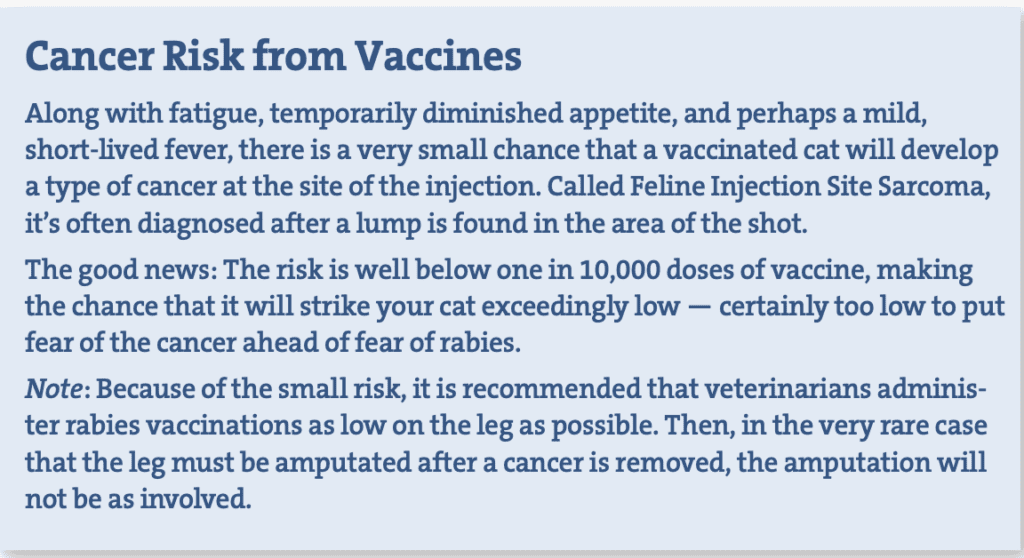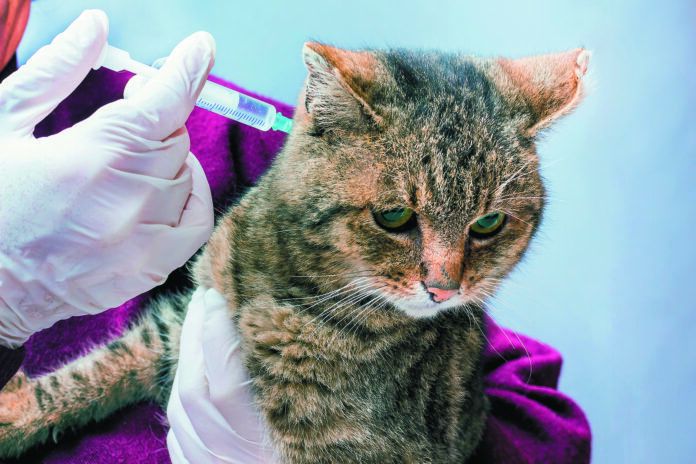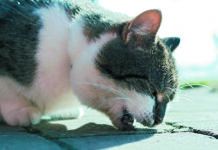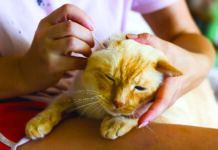A number of years ago, a survey of half a million cats showed that after receiving vaccinations, only one half of one percent of them had an adverse reaction. And almost all of those reactions — mild ones like lethargy and loss of appetite — were very short lived. No doubt that’s part of the reason that both the American Animal Hospital Association and the American Association of Feline Practitioners jointly state that vaccines are “medically essential” and “a critical component” of a cat’s healthcare plan.
They do make clear that when it comes to the non-core vaccines, which protect against such diseases as chlamydia, each cat’s vaccination needs should be assessed on an individual basis, taking into account variables like the pet’s age, lifestyle (indoor or out), and health history. But they concur with the World Small Animal Veterinary Association that all cats should be administered the core vaccines, which provide protection against panleukopenia, herpesvirus, calicivirus, and rabies, all of which can prove fatal. Even a house cat who lives with no other cats and never goes out requires these inoculations. The cat periodically goes to the vet, may be boarded sometimes, or could even be affected by bacteria or other pathogens that you bring into the house from outside.
Unfortunately, for all the science behind the vaccine recommendations from organizations whose entire raison d’être is to keep pets well, vaccinations in cats are waning — quickly. For instance, in 2016 in the UK, an estimated 84 percent of pets were vaccinated. By 2019, that number had dropped to 66 percent. Here in North America, a study that included more than 2,000 veterinarians in the U.S. and Canada indicated that at least 90 percent of clients with cats expressed concerns about administering core vaccines to their pets or refused them outright.
The reason for increased refusal of feline vaccinations
The American Veterinary Medical Association suggests that there’s a link between the “growing number of individuals who reject mainstream science regarding the safety and efficacy of vaccines” and the rise in people with cats who express concern about the safety and necessity of vaccinations for their pets. A few years ago, the World Health Organization even named vaccine hesitancy as one of the top 10 global threats to health.
It is believed that social media are fueling the rise in vaccine hesitancy. The researchers who polled veterinarians in North America write in the Canadian Veterinary Journal that “social media is one of the most common ways in which people access false information about vaccine safety. Most people now have access to the Internet and use it to not only find health-related information, but to create and share their own content. Messages about vaccines on social media predominantly focus on negative experiences because these are easier to visualize than the benefits of vaccines — the absence of disease. This has the result of increasing mistrust of vaccines and vaccine hesitancy.” Scientifically unsupported concerns about the safety of the inoculations against Covid-19 may have served to heighten overall skepticism.

Don’t buy into the false narrative — either on a chat group or a site about cat care — that vaccines will do your cat more harm than good. They protect not only your cat’s wellbeing but also your own life. On the off chance that your house cat contracts rabies, this potentially fatal disease can be passed on to you.




